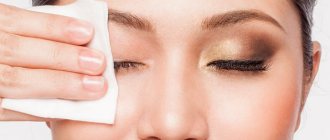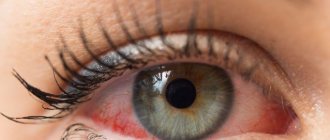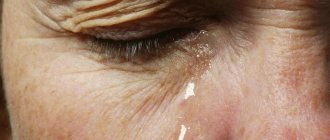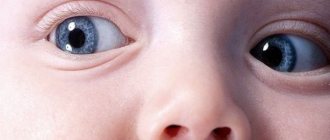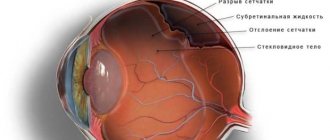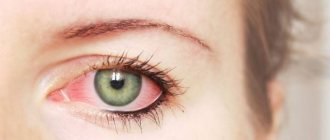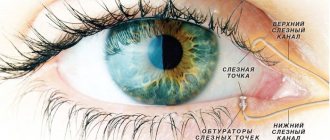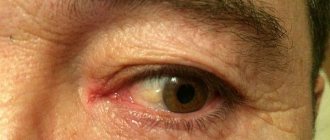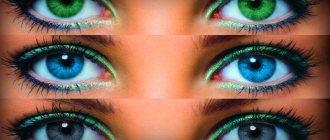Main symptoms
To study the problem of eye pain after sleep, you should consider the characteristic symptoms of the disease. These include:
- a feeling of sand in the eyes, that is, cutting and severe burning;
- disappearing and reappearing itching;
- increased photosensitivity;
- lacrimation;
- redness of the eyeball;
- swelling.
In addition, in severe cases, there may be discharge of pus from the eye sockets, loss of vision, and inability to focus the gaze. Some patients have headaches and eye pain after sleep, in which case it is worth considering the possibility of a migraine. This disease has several forms, some of which can cause pain in the eye sockets.
Liquorodynamic pain
Liquorodynamic disturbances appear when a person begins to fall ill with something serious; they arise as a result of various injuries and perinatal lesions of the nervous system. These disorders cause pain in the eye sockets and head; negative symptoms intensify with increased intracranial pressure, which increases due to volumetric processes. These processes limit the intracranial space, which causes very strong pain.
Liquorodynamic pain begins to torment a person if a cyst, neoplasm or abscess develops in the brain. An unbearable headache is considered very dangerous when the tumor in the posterior cranial fossa increases. In this case, severe pain is localized in the back of the head, and this pressure radiates to the eyeballs. If pain occurs in the orbital area, it is necessary to check for intracranial hypotension; it can develop due to a decrease in cerebrospinal fluid, that is, a violation of the secretion of cerebrospinal fluid by glandular cells.
Causes of discomfort
If your eyes hurt after sleep with a certain frequency or constantly, you need to think about the state of your health. Causes not caused by any diseases include eye fatigue, which occurs when reading for a long time or working at a monitor without special glasses. When overworked, the symptoms are muffled when the eyelids close, when the eyes have the opportunity to rest.
Eyes may hurt in the morning after sleep and with high blood pressure. In this case, as a rule, discomfort extends to the entire frontal part. An obvious explanation for why the eyes hurt in the morning after sleep may be that the organ is injured or there is a foreign body in it.
Pain and stinging in the eyes often occur with seasonal or chronic allergies. Unpleasant sensations can also be caused by the so-called “dry eye” syndrome. The root cause of this phenomenon is considered to be insufficient hydration of the mucous membrane of the eye. People who spend a lot of time in front of a computer are susceptible to it, which causes poor eye mobility and insufficient blinking. Thus, the natural process of moisturizing and cleansing the eyeball is disrupted.
Women may experience eye pain after sleep and due to hormonal changes. For example, many people feel this discomfort during menopause.
Correct diagnosis will help determine the exact cause. To do this, you need to contact a specialist at the first symptoms who will help you recognize the problem and prescribe the correct treatment.
Eyes hurt after sleep in the morning: causes, symptoms, treatment, drops, folk remedies
The eyes are considered the most sensitive human organ. That is why, as a reaction to some pathological process or external influence, pain occurs. If it is observed for a long period, then this is a signal to contact a specialist.
Eyes can hurt in the morning for many reasons. These include inflammatory or infectious processes, fatigue, and an allergic reaction. Only an ophthalmologist can figure out why discomfort occurs in the morning. When determining a particular pathology, it is important to take into account the side symptoms.
In addition to severe pain in the morning, the patient may experience:
- redness;
- itching;
- discharge from the eyes;
- burning sensation, pain;
In some cases, blurred vision or blurred vision may occur.
Why do my eyes hurt in the morning?
One of the common reasons why eyes hurt in the morning is lack of sleep, and fatigue can also affect it. Throughout the day, the organs of vision are constantly strained, which is why they need a long rest. If the patient suffers from insomnia and sleeps less than 5-6 hours, in the morning he feels discomfort because the eyes do not have time to recover.
However, the causes of eye pain in the morning can be more serious. Among them are:
- dry eye syndrome;
- incorrect selection of contact lenses;
- infectious diseases;
- pathologies of blood vessels, optic nerves;
- inflammatory processes.
Inflammatory diseases
A special place among the pathologies in which the eyes hurt badly in the morning is inflammation. They occur in adults and children of all ages and can be caused by infection, injury, or allergies. The most common inflammatory disease is conjunctivitis. It can be contagious and requires immediate treatment.
A patient suffering from conjunctivitis feels severe pain, the eyes stick together, and crusts form on the eyelashes. During the day, the discomfort may subside, and the amount of purulent discharge decreases. It should be noted that in the absence of proper therapy, conjunctivitis can become chronic.
My eyes hurt a lot in the morning, what should I do?
The effectiveness of visual treatment directly depends on correct diagnosis. What to do if your eyes hurt badly in the morning, only a specialist can tell you after conducting a series of examinations.
If your eyes hurt every morning, when you visit an ophthalmologist
, an examination will be performed, the doctor will listen to all your complaints and symptoms. If there are no external manifestations of the disease, you may be advised to conduct additional diagnostic tests.
The cost of diagnostics depends on the complexity of the pathology and varies across Moscow between 1000-5000 rubles. You can understand how serious your symptoms are by using the self-diagnosis service on our website. To do this, you need to answer several questions.
Which doctor treats eye pain?
If you experience pain in your eyes, you should contact an ophthalmologist, who will conduct an examination and make the correct diagnosis.
After the examination, the doctor will prescribe the necessary diagnostics in your case. Some diseases are difficult to diagnose, as they say “by eye”. Therefore, you need to trust your doctor when prescribing tests. After all the tests, the doctor will be able to formulate the correct course of treatment. Remember: accurate diagnosis and correct diagnosis are already 50% of success in treatment!
Eyes hurt in the morning: treatment
In order to get rid of unpleasant sensations, it is necessary to stabilize your sleep pattern, do eye exercises, and add foods rich in vitamins and minerals to your diet. But the absence of discomfort does not indicate the patient’s complete recovery.
In some cases, on the contrary, it may indicate the transition of the disease to a more serious form. That is why treatment if your eyes hurt in the morning should be comprehensive. It should be aimed at relieving symptoms and fighting what caused them. If you experience pain in your eyes, contact specialists at medical centers.
Experienced ophthalmologists will conduct all the necessary studies and prescribe effective treatment.
Main reasons
There are various reasons why your eyes hurt after sleep. In many cases, when a headache begins, the pain spreads to the eyes. This is accompanied by pressure on the eyeballs and a feeling of pain. These symptoms do not occur by chance; they are provoked by certain factors.
The eyes are a direct extension of the brain and are connected to the front of the brain through special anatomical organs called the optic tracts. And if any painful, negative processes occur in the brain, then this becomes the cause of an unpleasant eye condition.
Source: https://AptekaTamara.ru/glaza-bolezni/pochemu-bolyat-glaza-posle-sna.html
Probable diagnosis
There can be a huge number of reasons why your eyes hurt in the morning after sleep. Often the problem is inflammation of the eyeball, which can lead to glaucoma, keratitis or conjunctivitis. Insufficient personal hygiene, low immunity, eye injuries and improper handling of contact lenses can provoke acute conjunctivitis.
With keratitis, inflammation of the cornea of the eye with possible clouding is observed. With glaucoma, there is little pain, but there is a slow decrease in visual acuity.
In addition, pathologies that can cause the above symptoms include optic neuritis. If, in addition to pain, the patient also experiences a sharp decrease in vision, then perhaps due to infectious processes or some autoimmune diseases he has developed neuritis. Some ENT diseases (otitis media or sinusitis), as well as dental pathologies, can also cause eye pain.
If there is swelling of the eyelid, pain when pressed, itching and lacrimation, sometimes an increase in temperature, then it is likely that the cause of the symptoms was inflammation of the intraciliary margin, in other words, barley. Inflammation of the eyelids, blepharitis, is caused by disruption of the human endocrine system, viruses and low immunity. It is distinguished from the symptoms of stye by increased fatigue, peeling of the skin around the eyes, and the formation of a dry crust on the eye sockets.
In the case when, in addition to pain in the eyes, the patient complains of a headache and the inability to focus, corneal or lenticular astigmatism is possible. Symptoms of the above diseases can appear in one or both eyes. But if after sleep the left eye hurts as much as the right one, and in addition, photophobia, severe swelling, lacrimation and hyperemia are observed, then perhaps we are talking about a viral disease, transmitted from contact with the sick person’s things - trachoma.
Inflammation of the frontal sinuses
Frontal sinusitis is a fairly rare disease, but sometimes this disease causes headaches and discomfort in the eyeballs. When this diagnosis is made, it means that the patient has inflamed mucous membranes of the frontal sinuses. Frontitis occurs when a viral or bacterial infection enters and develops.
Symptoms of this disease include not only pain in the temples and eyes, but also mucous discharge from the nasal cavity begins, the sinuses become blocked, making breathing difficult. The pain syndrome in this case is quite intense and acute, the symptoms are somewhat similar to a neurological disease.
Diagnosis and treatment
Treatment of any eye disease typically includes an examination, measuring eye pressure and passing the necessary tests. Among the newest diagnostic methods are biomicroscopy and genioscopy. Biomicroscopy allows examination using a slit lamp, which is used to diagnose uveitis in a patient. Genioscopy is aimed at identifying glaucoma. She examines the general drainage system of the visual organs.
In controversial cases, an ultrasound examination may be prescribed. A set of these procedures is guaranteed to answer the question of why the patient’s eyes hurt in the morning after sleep, and will help the doctor make the correct diagnosis.
With drug treatment, in case of diseases of the eyeball, the doctor will prescribe drops and tablets to eliminate an eye or nasal infection. In cases where the cause of pain is a foreign object, the latter is removed and a course of antibacterial and healing drugs is prescribed. If viral infections are identified as the cause of the pain, the doctor will prescribe antibiotics, immunostimulating and antihistamines. All eye drops should be dripped no more than six times a day, two or three in each eye.
Eye drops and ointments
In cases where eye pain is caused by a sore throat or herpes, it is recommended to use oxolinic ointment and chloramphenicol drops. For dry eye syndrome, doctors recommend Actipol, Vidisik drops or Dexpanthenol ointment.
Tetracycline ointment is suitable for treating conjunctivitis and reducing pain. If the discomfort was caused by an acute manifestation of an allergic reaction, then it is necessary to drip Opatanol.
For keratitis, conjunctivitis and blepharitis, Oftocipro ointment is used; it has a wide antimicrobial spectrum. Tobrex is considered an effective antibiotic in the form of eye drops, but please note that the dosage, course and rules for taking each drug must be regulated by the attending physician.
Useful video
From this video you will learn the causes, symptoms and treatment of pain and pain in the eyes:
Eyes can hurt after sleep due to various factors , be it inflammatory diseases or basic lack of hygiene.
All that needs to be done to improve the condition is to remove irritants and provide the eyes with proper rest.
If the pain does not go away, you should consult a specialist, after which adequate treatment will be prescribed.
It is important to remember: you should not ignore existing symptoms, because they can be an “alarm bell” of a serious pathology.
(Guest)
Andrey
07/24/2011 07:17
“The frequency of pain used to be about 4 times a year, recently once every 3 months”
Sorry, I wanted to write that now every 2-3 months
Alla Pilipchuk
|
(Female, 59 years old, Mozyr, Belarus)
|
08.10.2012 02:23
Hello. My son (28 years old) was sleeping and woke up from a sharp pain in the gases, he could not open his eyes, photophobia, there was no welding or a grinder. We were in the emergency department, they gave us pain-relieving drops and sent us away. After the drops, he opened his eyes, but says as if there is sand in the eyes
(Guest)
Maria suffered
11/28/2014 09:08
Hello! please help! At night I woke up from sharp pain in my eye, I went to rinse it, it didn’t help, my parents dropped drops, but it didn’t help. In the morning everything still hurts, and the pain is as if something very large had gotten into the eye. When the eyes are closed the pain is even greater, but if they are open it doesn’t hurt. I can’t clip it, it hurts a lot. Please tell me something! (12 years old)
CREATE NEW MESSAGE.
But you are an unauthorized user.
If you have registered previously, then “log in” (login form in the upper right part of the site). If this is your first time here, please register.
If you register, you will be able to further track responses to your messages and continue the dialogue on interesting topics with other users and consultants. In addition, registration will allow you to conduct private correspondence with consultants and other users of the site.
Register
Create a message without registration
Practically, during sleep, at the moment when you seem to wake up, severe pain occurs in one eye, so strong that it is scary not only to open it, but even to move your eyes with your eyelids closed. Then I gather my courage, press my hand to my eye and slowly try to open my eyelids. The pain is as if something hard was poked right into my eye, a strong tear appears and for some time all this cannot calm down. Repeats two or three times during the night. And only at night. WHAT IS THIS? The ophthalmologist said it was dry eye syndrome. But during the day, nothing like that happens, and all sorts of sand and scratches - that’s not there either. What to do? how to live? Save with advice!
Post edited by Natalia1960: March 13, 2014 - 10:53
Headache (cephalgia) is a symptom that is characteristic of many diseases. Painful sensations of varying intensity, localization, and duration provoke the development of depression, autonomic disorders, and sleep disorders.
Headaches at night due to an uncomfortable pillow, sleeping position, or reasons related to the spine, blood vessels, or psychological stress. Night pain occurs when falling asleep, sleeping or waking up. The source of origin can be identified after examination by a specialist.
Folk remedies
For pain in the eyes, traditional medicine recommends pouring boiling water over a tablespoon of birch leaves. Leave the infusion for half an hour, and then strain and make lotions twice a day. This remedy will relieve eye fatigue and eliminate inflammatory processes.
In case of eye strain, it is recommended to make decoctions of aloe, chamomile and plantain leaves. In addition, the combination of celandine and honey relieves inflammation well. You need to dissolve a tablespoon of celandine in hot water, bring to a boil, boil for about five minutes, leave for half an hour and then add honey. You will need to soak gauze or a cotton swab in the infusion and place it on your eyes for five to seven minutes. Tea brewing is considered an effective way to relieve pain, swelling and fatigue.
Recovery period
During the recovery period, it is important to prevent re-infection or recurrence of pain. To do this, ophthalmologists advise maintaining eye hygiene (do not touch your eyes with dirty hands, use only your own towels), visit an ophthalmologist from time to time, maintain a strong immune system, and do eye exercises.
During the recovery period, it is extremely necessary to adhere to proper nutrition and daily routine, and to give up bad habits. Also, do not forget about eye protection from solar radiation when working at the monitor.
Cluster headaches
Painful attacks occur in paroxysms and are difficult to bear. Penetrating pain:
- localized in the eye area;
- radiates to the forehead, cheek, temple;
- accompanied by forehead sweating, lacrimation, and a rush of blood to the face;
- in a supine position they are felt more acutely;
- start and go away suddenly.
The headache starts to hurt for no reason between 21:00 and 9:00 am, the peak time is from 0:00 am to 3:00 am. Attacks occur cyclically, followed by painless periods. Attacks are observed mainly in males and are aggravated by alcohol consumption. Risk factors include men whose relatives suffer from cluster pain. The risk increases with head injuries, sleep disorders, migraines, and physical and mental stress. Possible causes of the disorder include abnormalities of the hypothalamus, pathologies of blood vessels, and disruption of circadian rhythms. An acute attack can be treated at home with lidocaine drops in the nose. For symptomatic therapy, special medications and oxygen inhalations are prescribed; in difficult cases, electrical stimulation of the brain is performed, and the nerves that cause pain are removed. During the cluster period, it is recommended to give up nicotine and alcohol.
Ophthalmologist's advice
Ophthalmologists, answering the question of why eyes hurt after sleep, advise adhering to the basic rules for the prevention of eye diseases to prevent this kind of pain. Allergy sufferers are advised to remove irritants when working behind monitors - spend more time in the fresh air, give their eyes a rest, taking breaks of ten to fifteen minutes, and use the necessary protective equipment. The general advice is to sleep seven to eight hours a night. In addition, do not forget about eye hygiene and regular examination by a specialist.
Treatment
Keep in mind! Depending on the cause of discomfort, experts recommend:
- Eliminate irritating factors (for example, in case of allergies, use hypoallergenic products, wet clean the room, etc.).
- Spend more time outdoors.
- Give your eyes the necessary rest (for example, if you work at a computer, take a 15-minute break at least once an hour).
- Get enough sleep (at least 7-8 hours).
- Maintain eye hygiene (carry out water procedures in the morning and evening, do not go to bed with makeup).
- Recheck your vision with an ophthalmologist and, if necessary, select other lenses or glasses (including do not touch lenses with dirty hands and use only clean containers for them).
- Treat colds in a timely manner.
- Be examined by an endocrinologist (for the presence of hormonal disorders).
Eye drops and ointments
Important! In case of inflammatory diseases, it is recommended to use the following drugs:
- Aktipol (drops). An effective antiviral and immunomodulatory agent intended for the treatment of viral conjunctivitis and keratitis. In addition, the drug can be used for dry eye syndrome or in case of fatigue. It is recommended to instill 1-2 drops into the conjunctival sac up to 6-8 times a day (for inflammatory diseases). Course of treatment: 5-7 days. And to eliminate dryness and pain, 1-2 drops are enough. 2-3 times a day. The average price is 300 rubles (5 ml).
- Tetracycline ointment. Antimicrobial and bacteriostatic agent for the treatment of conjunctivitis and relief of pain after waking up. The ointment must be placed into the conjunctival cavity up to 3-5 times a day (in case of inflammation). Price - 75 rubles (5 g).
- Opatanol (drops). Antiallergenic agent to relieve allergy symptoms and subsequent discomfort. Instill 1 drop 2 times a day. Price - 480 rubles (5 ml).
- Oftocipro (ointment). A broad-spectrum antimicrobial drug intended for the treatment of diseases such as keratitis, blepharitis, conjunctivitis, etc. Place behind the lower eyelid (in a small amount) up to 3 times a day. Course of treatment: 5-7 days (on average). Price - 180 rubles (3 g).
- Tobrex (drops). A broad-spectrum antibiotic, effective for the treatment of conjunctivitis, keratitis, blepharitis, cyclitis, etc. Instill 1-2 drops every 4 hours (until symptoms subside). Price - 185 rubles (5 ml).
Each specific case requires an individual dosage and course of treatment (especially in the case of glaucoma) - for this you should consult a doctor.
Be careful! Self-medication is not recommended, because in the case of inflammatory diseases it can only worsen the situation.
Folk remedies
As folk remedies, it is worth trying lotions and rinses made from pharmaceutical herbs (chamomile, sage, etc.).
And, unlike pharmaceutical drugs, they will not cause harm.
To prepare the decoction you need 1 tbsp. l. dry herbs (or a filter bag) pour a glass of boiling water, then cool (strain if necessary) and apply to closed eyelids for 10-15 minutes (or rinse your eyes with the decoction).
Frequency of procedures: 5-6 times a day (until pain is eliminated).
